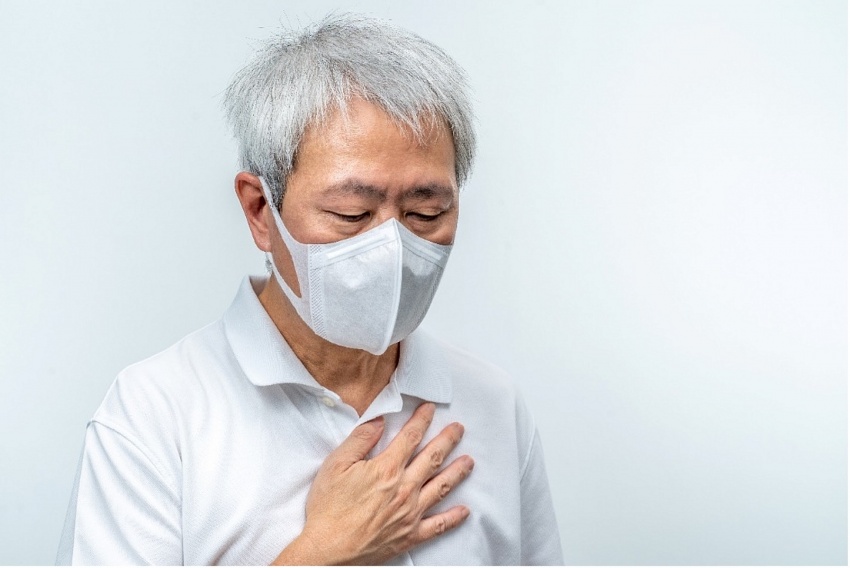COPD treatment is of utmost importance
After participating as a consultant at multiple COPD conferences around the world, what do you think about the launch of this new therapy in Vietnam?
There are few differences in patients with COPD between countries. Vietnam has had to continue using older treatments for a longer period than many other countries, so it is very exciting to talk to Vietnamese physicians about new treatments for COPD patients in Vietnam.
 |
| Professor Paul Jones at a scientific symposium on COPD. Photo: GSK |
What are the specific challenges confronting COPD patients and healthcare professionals?
COPD has an extremely big impact on a patient's life, which not only restricts their daily activities and reduces their quality of life, but can also cause multiple exacerbations, or lung infections. The effect of these can last for weeks or even months, and following each episode the patient's health deteriorates and the severity of their COPD worsens. Treatment to prevent these events is of the utmost importance.
Are there any breakthroughs for COPD patients in Vietnam?
The new triple therapy is a significant breakthrough, with very strong evidence from pivotal scientific studies that demonstrate its effectiveness. The duration of action of the drugs inside the new inhaler permits its use just once a day, bringing with it greater efficacy throughout the day and greater convenience to the patient.
 |
| COPD can make it difficult for patients to breathe even when sitting still. Photo: Shutterstock |
What can healthcare professionals do to improve the health of COPD patients?
It is important for patients and physicians to be aware of the severity and impact of exacerbations. Each exacerbation can cause damage to the lung, the more exacerbations they experience, the more damage occurs, it is a cumulative effect. Therefore, we need to help patients to realise the severity of exacerbations and seek timely treatment therapy.
Besides, doctors need to be more ambitious for their patients by applying the best therapies and encouraging them to adhere to the treatment. They should also encourage patients to stop smoking if they are still doing so, increase their physical activity by doing more exercises or joining a rehabilitation programme. Those activities all help the patient's exercising capacity, breathlessness, and quality of life.
I have two important pieces of advice for doctors and healthcare professionals. First, encourage patients to not ignore their COPD symptoms and exacerbations. Second, be more ambitious with treatment to maximise the benefit that this new treatment can bring.
| Professor Paul Jones is an academic and medical professional. In the past, he served as a valued member of the Global Initiative for Chronic Obstructive Lung Disease Scientific Committee and Board of Directors. Currently, Professor Jones has undertaken a role as a Medical Director at GSK, a global biopharma company known for its goal of uniting science, technology and talent to get ahead of disease together. He recently paid a visit to Vietnam, engaged in a series of scientific symposia on chronic obstructive pulmonary disease. |
NP-VN-RS-PRSR-240006. ADD: 04/2024
What the stars mean:
★ Poor ★ ★ Promising ★★★ Good ★★★★ Very good ★★★★★ Exceptional
 Tag:
Tag:
Themes: Healthcare Platform
- PM outlines new tasks for healthcare sector
- Opella and Long Chau join forces to enhance digestive and bone health
- Hanoi intensifies airport monitoring amid Nipah disease risks
- Cosmetics rules set for overhaul under draft decree
- Policy obstacles being addressed in drug licensing and renewal
Related Contents
Latest News
More News
- PM outlines new tasks for healthcare sector (February 25, 2026 | 16:00)
- Myriad risks ahead, but ones Vietnam can confront (February 20, 2026 | 15:02)
- Vietnam making the leap into AI and semiconductors (February 20, 2026 | 09:37)
- Funding must be activated for semiconductor success (February 20, 2026 | 09:20)
- Resilience as new benchmark for smarter infrastructure (February 19, 2026 | 20:35)
- A golden time to shine within ASEAN (February 19, 2026 | 20:22)
- Vietnam’s pivotal year for advancing sustainability (February 19, 2026 | 08:44)
- Strengthening the core role of industry and trade (February 19, 2026 | 08:35)
- Future orientations for healthcare improvements (February 19, 2026 | 08:29)
- Infrastructure orientations suitable for a new chapter (February 19, 2026 | 08:15)

























 Mobile Version
Mobile Version